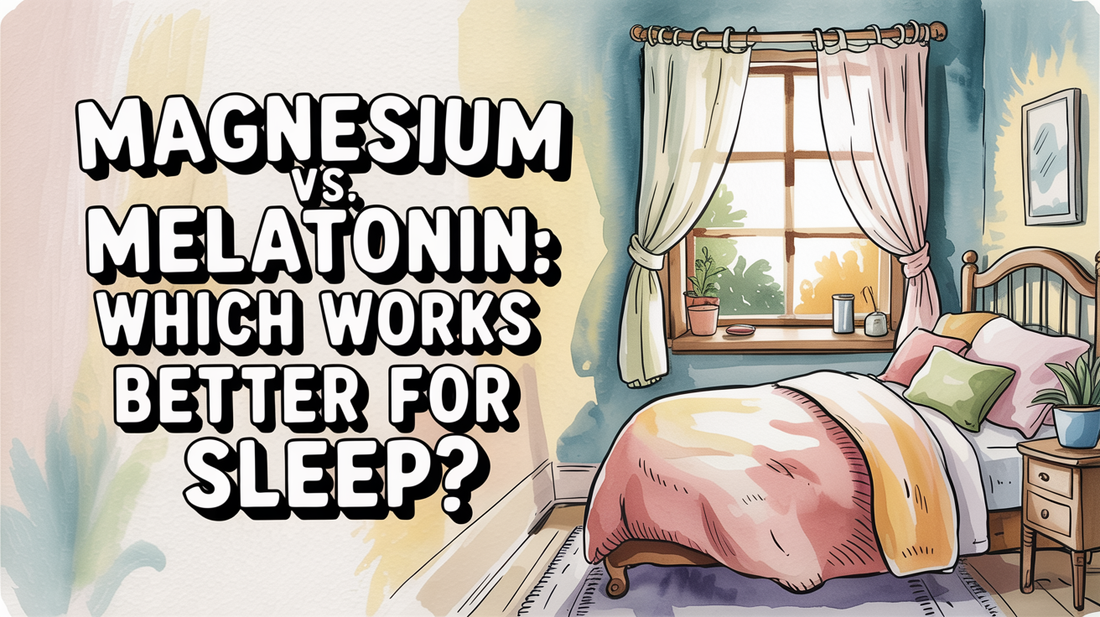Is magnesium better than melatonin for sleep?
Are you struggling to find restful sleep? You’re not alone. Many people are exploring alternatives like magnesium vs melatonin to discover the best sleep supplement that works for them. In this post, we’ll discuss how natural sleep aids can enhance your nightly routine. We’ve organized the information into three clear sections, giving you actionable insights to try tonight.
Melatonin resets circadian rhythm; magnesium promotes relaxation and melatonin production
Both melatonin and magnesium play unique roles in supporting sleep. Melatonin, a natural hormone produced by the pineal gland, helps signal your body that it’s time to sleep, while magnesium is a vital mineral that can promote muscle relaxation and may aid in the production of melatonin itself. By understanding their different functions, you can find a balance that works for you.
Melatonin directly interacts with receptors in your brain, indicating that it’s time to rest. In contrast, magnesium serves as a natural relaxant by regulating neurotransmitters like GABA, which calms the nervous system. A deficiency in magnesium may hinder natural melatonin production, potentially leading to a cycle of poor sleep quality.
- Melatonin signals sleep readiness to the brain.
- Magnesium helps relax muscles and nerves.
- A lack of magnesium can disrupt melatonin production.
- As we age, melatonin levels may decline, causing sleep issues.
- Magnesium supports over 300 bodily functions, including melatonin synthesis.
Try It Tonight: Quick Start ✅
- Screen-free + dim lights for 10–15 minutes.
- Gentle stretch or slow breathing (4–7–8).
- Apply Magnesium Spray as directed (e.g., 4–8 sprays on legs/arms/shoulders 10–20 minutes before bed). Patch-test if new to topicals.
Melatonin works best for jet lag or schedule shifts
Melatonin shines in situations where your body’s internal clock needs adjusting, such as during travel or shift changes. Research indicates that melatonin is particularly effective for resetting circadian rhythms, making it ideal for conditions like jet lag. For best results, it’s suggested to take melatonin 30 minutes to 2 hours before your desired sleep time.
For example, if you’re traveling across time zones, try taking melatonin just before your new bedtime to help your body adapt. This is particularly useful for shift workers who often need to recalibrate their sleep-wake cycles. However, keep in mind that melatonin is more effective for initiating sleep rather than maintaining it throughout the night.
- Melatonin is effective for jet lag when timed correctly.
- Shift workers can benefit from melatonin to adjust schedules.
- Best for helping you fall asleep rather than staying asleep.
- Timing is crucial—too early or late can disrupt sleep further.
- Melatonin is best for short-term adjustments, not chronic insomnia.
Why We Recommend a Gentle Helper 🌿
Magnesium Spray is designed for quick absorption and offers a soothing, non-sticky feel with calming lavender notes. It may support a consistent bedtime ritual, making it a gentle addition to your sleep routine.
- Quick-absorbing comfort—no heavy residue.
- Gentle feel designed to minimize tingling/itch.
- Clean-leaning and bedtime-friendly scent.
Some benefit from using both, alongside lifestyle habits like reducing screen time 🔍
Many experts suggest a comprehensive approach to sleep that combines supplements like magnesium and melatonin along with healthy lifestyle habits. This multifaceted strategy may help address several aspects of sleep quality and support the body’s natural processes more effectively.
For instance, some individuals find that taking a low dose of melatonin (0.5-3mg) alongside magnesium (200-400mg) about 1-2 hours before bedtime can enhance their sleep routine. Moreover, reducing screen time is crucial, as blue light can hinder melatonin production, so turning off devices an hour before bed is recommended for better sleep quality.
- Combining melatonin and magnesium may enhance sleep quality.
- Reducing screen time supports natural melatonin production.
- Good sleep hygiene practices enhance supplement effectiveness.
- Consistency in bedtime can improve overall sleep quality.
- Individual responses to supplements may vary; tailor to your needs.

